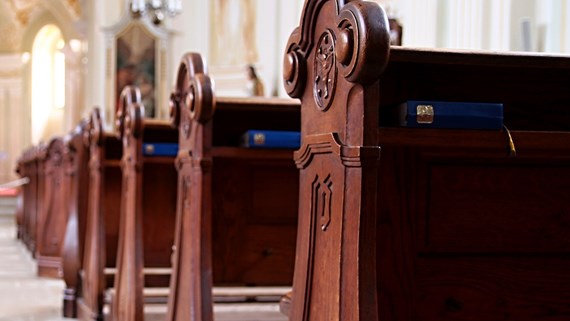Sexual abuse in the Church: our analysis of IICSA’s Anglican Report and lessons for faith organisations
Insight

Last month IICSA (Independent Inquiry into Child Sexual Abuse) published its investigation report into the Anglican Church.
This report is the output from an investigation which focused on the extent to which both the Church of England and Church in Wales (which for ease of reference we refer to as "the Church") protected children from sexual abuse in the past, its failings in the protection of children, and the effectiveness of its current safeguarding.
The report follows a public hearing in 2019 and draws on two previous specific case studies: the Diocese of Chichester and Peter Ball. The reports of those investigations can be found here.
In this briefing, we analyse the key findings from IICSA’s report. In our opinion, many of these are useful lessons which are transferable to other religious settings. Below we add our analysis and suggestions for creating safer organisations.
Data
Firstly, its useful to look at the data in the report. At pages 2 to 7, there is an extensive section on data including a close look at the structure of the Church and the ways in which it interacts with children.
- From the 1940s until 2018, the total number of clergy or others in positions of trust associated with the Church who were convicted of child sexual abuse was 390. This is in the context of the Church being the largest Christian denomination in this country with over a million regular worshippers. However, that number should be treated with caution as it relates to the number of people convicted through the criminal system and the number of convictions will undoubtedly be lower than the actual number of people who have committed child sexual abuse in the Church. As IICSA said: "it is not possible to accurately identify the scale of sexual offending within the Church".
- In 2018, 155 concerns were reported about non-recent child sexual abuse. In addition, in 2018, 449 concerns were reported to the Church about recent child sexual abuse of which more than half related to church officers. Whilst this statistic is alarming, it is important to remember that in order to create a safe culture for children, organisations should be encouraging the reporting of all concerns including low level concerns to responsible safeguarding officers (see our ground-breaking guidance on low-level concerns published earlier this year here).
- Quite obviously, these statistics demonstrate that child sexual abuse is not a problem that is confined to the past. In our experience, there can be a temptation within organisations to believe that such crimes were more prevalent in previous decades. But organisations must be sure to be alive to the risks of sexual abuse within their settings today and take steps to prevent it.
- IICSA found that a significant amount of offending involved the downloading or possession of indecent images of children. The NCA-CEOP advise that: "online child sexual abuse and exploitation continues to grow as ever more sophisticated digital tools protect anonymity and phone apps encourage children to engage in risky behaviour."
- Online abuse is frequently carried out by lone offenders who gain access to children, and evade detection, using the dark web and otherwise the mainstream internet. Criminals groom children both in person and online, and may travel to carry out their abuse in countries where the law may be more lax. The NCA-CEOP run a dedicated training programme to help educate children, parents and carers and other professionals about staying safe online. The “Thinkuknow” programme is available here.
- Between 2003 and 2018, the main insurer of the Church managed 217 legal claims relating to child sexual abuse in the Church. Over a 15-year period for the national Church this can be seen to be a relatively modest number of legal claims. However, in non-recent abuse cases there can be a tendency within organisations to assume that someone is making a non-recent allegation because they are motivated by the prospect of a monetary claim. Whilst it is certainly the case that survivors of sexual abuse can and do pursue financial claims (as their legal right to do so if they chose), monetary claims are often not pursued. In our experience, survivors have a wide range of motivations for making a disclosure, such as a desire to ensure that young people today are protected and/or wanting an acknowledgement of what happened to them, among many other reasons.
Report: high level summary
Through the use of case studies, including cases from the 1970s as well as the mid-2000s, IICSA made a series of critical findings against the Church. These include, amongst others, that:
- the Church often gave more support to the perpetrators than to the victims;
- there were multiple examples of perpetrators being forgiven and allowed to continue working with children;
- public support was given to the offending clergy, a high-profile example being Peter Ball who was cautioned in 1993 but remained a clergy member despite allegations until 2015 when he was convicted and imprisoned for sexual offences;
- excessive attention was often paid to the circumstances of the alleged perpetrator in comparison to the attention given to victims or others who made disclosures of abuse or of the risk that alleged perpetrators posed; and
- sometimes sexual offending was minimised.
Case example: excessive attention on the perpetrator’s circumstances
Robert Waddington (the Dean of Manchester Cathedral from 1984 to 1993) was the subject of a number of allegations over many years. Nevertheless, his permission to officiate was allowed to continue on the grounds of his age and frailty without any consideration of the risks to children with whom he came into contact.
We have seen similar scenarios in faith cases, where a greater emphasis can be seen to be placed on the welfare and needs of the perpetrator than on the victim, their family and other witnesses. There is a balance to be struck when supporting all parties involved in a case.
Case example: sexual offending minimised
Reverend Ian Hughes was convicted in 2014 of downloading 8,000 indecent images of children. Bishop Peter Forster suggested that Hughes had been "misled into viewing child pornography" on the basis that "pornography is so ubiquitously available and viewed". More than 800 of the images downloaded by Hughes were graded at the most serious level of abuse.
The report also said that the culture of the Church meant it was "a place where abusers could hide" and the Church’s safeguarding failures added to the already significant trauma of the victims.
Key learning
All faith organisations should use IICSA’s report as a good opportunity to strengthen their safeguarding systems.
Below we have drawn out 10 key areas from the report which faith organisations could usefully consider within the context of their own settings.
1. Resourcing of safeguarding
IICSA found that the child protection system in the Church was at times under-resourced. Unfortunately, we still see scenarios in religious organisations where it is obvious that this is the case. This can be where safeguarding leads are unpaid volunteers, who have dual roles and/or are simply not equipped with the time, training, resources or access to specialist advice to effectively perform the role. All faith organisations should carefully reflect on whether their current systems are adequately resourced with competent staff that have the necessary skill sets, experience, and training.
2. Significant weakness in policies and the implementation of policies
Prior to 2013, IICSA found that many of the Church of England’s safeguarding policies had significant weaknesses and that the implementation of those policies was patchy. Related to this, IICSA found:
- The sheer volume of the Church’s guidance had created confusion, so much so that IICSA recommended it should be rationalised into one simple and accessible set of procedures.
- The Church’s current bi-annual reviews of clergy ministerial development do not assess or monitor the performance of an individual’s behaviour in relation to safeguarding, or their understanding of safeguarding functions. IICSA suggested including these safeguarding considerations in the reviews which would be a logical continuation given such considerations are made when assessing a candidate’s suitability for ordination.
3. Record-keeping
A sampling exercise had demonstrated frequent cases of poor record-keeping and a total absence of records in others. As such, IICSA recommended there should be clear policies on record-keeping and that, in addition, safeguarding staff need to have access to the relevant personnel files.
4. Effective safeguarding is required at parish, diocesan and Church-wide level
IICSA highlighted that the model suggested by the Chichester Diocesan Safeguarding Adviser provides a starting point for the Church to consider effective safeguarding; in particular, Mr Perkins’ suggestion that the role of “Diocesan Safeguarding Adviser” become “Diocesan Safeguarding Officer”. The change in title is significant: “officers” should be taking decisions not simply providing advice. It is essential that operational decisions about safeguarding are made by safeguarding professionals. Linked with this, IICSA made clear that Diocesan Safeguarding Officers should have sufficient authority to take action without the approval of a bishop in respect of key safeguarding tasks, such as:
- reporting safeguarding matters to statutory authorities;
- managing or commissioning lessons learned reviews;
- commissioning investigations;
- commissioning and instructing risk assessments during or following safeguarding investigations;
- ensuring that pastoral support is given to complainants in safeguarding investigations (including during police or Clergy Discipline Measure investigations); and
- reporting serious incidents to the Charity Commission.
"Diocesan bishops have an important role to play, in particular to help congregations and clergy to understand safeguarding and to make it a priority, ‘intrinsic to the beliefs’ of the Church of England, but they should not hold operational responsibility for safeguarding."
IICSA investigation report into the Anglican Church
5. Safeguarding advice overlooked
IICSA found that safeguarding personnel were at times ignored and their advice overlooked in favour of protecting the reputation of clergy and the Church. It is a serious issue when an organisation ignores the advice of the safeguarding professionals without good reason. Whilst reputation management is an important aspect of protecting a charity, it should never be at the expense of protecting people and responding properly to allegations.
6. Deference to the authority of the Church and to individual priests
IICSA found that there were taboos surrounding discussion of sexuality. In addition, it found an environment where alleged perpetrators were treated with more support than victims which created barriers to disclosure that many victims could not overcome. Another aspect of the Church’s culture was clericalism, which meant that the moral authority of clergy was widely perceived as beyond reproach.
"Culture change is assisted by senior Church leaders now saying the right things, but lasting change will require more than platitudes. It will need continuous reinforcement of the abhorrent nature of child sexual abuse and the importance of safeguarding in all of the Church’s settings."
IICSA investigation report into the Anglican Church
Related to this, IICSA found examples of clergy who were unable or unwilling to properly fulfil their safeguarding responsibilities and recommended that attitudes to safeguarding ought to be an important aspect in the selection and training of clergy.
7. Case reviews
IICSA found that the Church would benefit from a suitable programme of regular internal progress reviews. When independent reviews are undertaken into individual cases of the most serious safeguarding concerns, their commission would benefit from closely liaising with the victim or survivor, as well as other relevant parties. IICSA found that some of the Church’s past cases and external reviews were inadequate. In our experience, commissioning case reviews involves a wide range of considerations such as:
- clarity in regard to the purpose of the review, the terms of reference and methodology;
- proper consideration of legal areas such as:
- data and information sharing;
- reporting of concerns and allegations;
- serious incident reporting to the Charity Commission;
- the employment or other rights of clergy, staff, and others;
- welfare and support for victims and witnesses;
- the area of "Maxwellisation" of a draft report; and
- whether or not the report should be published.
8. Cathedrals and schools
IICSA found that where a cathedral has links with choir schools, clarity is required between the cathedral and school to ensure that there are commonly understood policies. There should be no ambiguity about where responsibility for responding to safeguarding concerns lies.
9. Poor engagement with victims and survivors
IICSA found that the Church has been slow to find ways to engage effectively with victims and survivors, or to learn from their experiences. This is a critical area to get right as responses to victims and survivors speaks volumes to the religious organisation’s current attitude to safeguarding. There are many small steps which can go a long way in supporting survivors, such as:
- offering meetings with senior people in the Church;
- giving access to independent agencies that can offer support;
- providing access to counselling and therapeutic services;
- apologising where appropriate; and
- providing access to records where appropriate.
10. Finally, civil claims
IICSA made a series of findings under this head as follows:
- sensitivity and tact are required throughout the management of civil claims relating to child sexual abuse;
- those managing claims need to demonstrate an understanding of the psychological effects of child sexual abuse and the potential for additional distress to be caused by the litigation process;
- while the Church is not directly responsible for the management of an insured claim, the Church retains responsibility for providing pastoral support to complainants, victims and survivors; and
- what many victims and survivors want is a genuine and meaningful apology. The Church’s insurer has said that it is a matter for the Church as to how such apologies should be made and who would be the appropriate person to do this.
On a positive note
Since the publication of the Archbishop’s Visitation to the Diocese of Chichester in 2013, IICSA found that much has improved, including in relation to:
- governance;
- training;
- audits; and
- policies and procedure.
"Senior leaders have demonstrated a determination to make necessary changes to keep children safe. To be effective, this determination needs to be translated into action throughout the Church."
IICSA investigation report into the Anglican Church
Leaders in the Church have apologised for its actions, recognising that the failings identified by IICSA and other reviews were “profoundly and deeply shocking”.
The Charity Commission
Finally, all those working in faith organisations should note the recent comments from the Chief Executive of the Charity Commission to MPs as reported on 21 October 2020. Although the comments were largely directed at the international aid sector, we consider them to be of application to charities more generally. The Chief Executive reportedly told MPs that:
- safeguarding should be a "number one priority" for global development organisations and that charities should face consequences if they fail to protect beneficiaries from harm;
- the Charity Commission believes keeping people safe, inside and outside the UK, is “a number one priority” for all charities;
- strong safeguarding procedures are not a "nice-to-have" administrative overhead, they are an essential part of being a charity; and
- safeguarding obligations "remain essential" at all charities, regardless of financial pressures resulting from COVID-19.
Farrer & Co acted for clients across several of IICSA’s investigations including those into the Roman Catholic Church, Residential Schools, Child Migration, the Anglican Church, and Religious Organisations. This work has provided powerful insights to the risk factors in each of these organisations of child sexual abuse as well as best practice in preventing and handling the same. For questions on our work in this area or anything in this briefing please contact Maria Strauss, partner, or Caitlin Farrar, associate, or your usual contact at the firm.
This publication is a general summary of the law. It should not replace legal advice tailored to your specific circumstances.
© Farrer & Co LLP, November 2020







